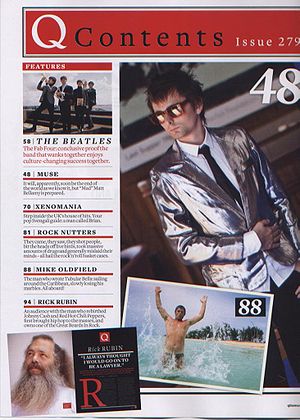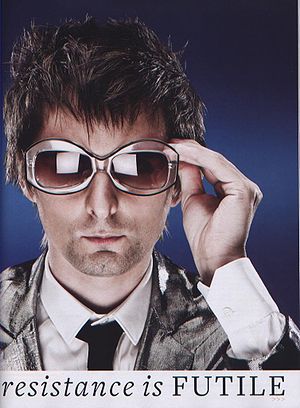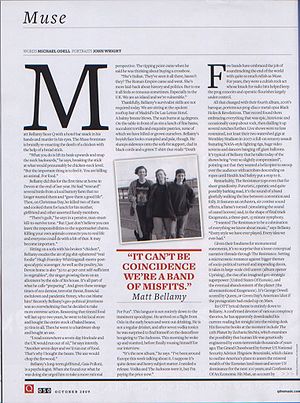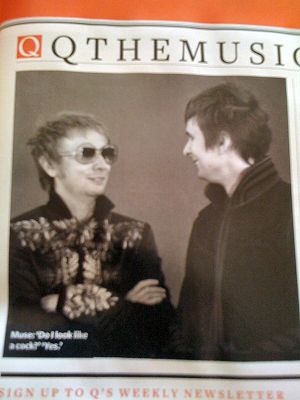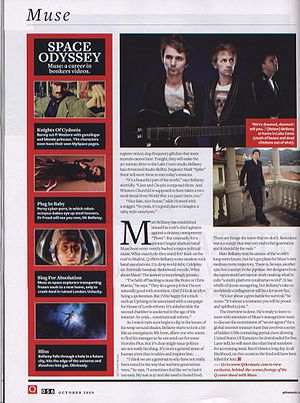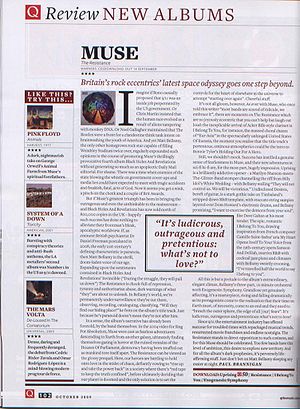Q 2009-08-21 – Matt Bellamy is out of control
To cite this source, include <ref>{{cite/Q 2009-08-21}}</ref>
A series of photographs along with a review of The Resistance.
There are those who thought Muse could get no more OTT and their singer Matt Bellamy no stranger. They were wrong.
resistance is FUTILE
WORDS MICHAEL ODELL PORTRAITS JOHN WRIGHT
Matt Bellamy faces Q with a hotel bar snack in his hands and murder in his eyes. The Muse frontman is brutally re-enacting the death of a chicken with the help of a bread stick.
"What you do is lift its beak upwards and snap the neck backwards," he says, breaking the stick at what would presumably be chicken-neck level. "But the important thing is to feel it. You are killing an animal. For food."
"Bellamy did this for the first time at home in Devon at the end of last year. He had "rescued" several birds from a local battery farm that no longer wanted them and "gave them a good life". Then, on Christmas Day, he killed two of them and cooked them for lunch for his mother, girlfriend and other assorted family members.
"There's guilt," he says in a pensive, man-must-kill-to-survive tone. "But I just don't believe you can leave the responsibilities to the supermarket chains. Killing your own animals connects you to real life and everyone could do with a bit of that. It may become important."
Sitting on a sofa with his broken "chicken", Bellamy exudes the air of pig shit-splattered "real foodie" Hugh Fearnley-Whittingstall-meets-post-apocalyptic scavanger. As well as the poultry, his Devon home is also "30 to 40 per cent self-sufficient in vegetables", the singer growing them on an allotment by the side of his house. It's all part of what he calls "preparing". And [sic] given these strange times of eco demise [sic], terrorist threat, [sic] financial meltdown and pandemic frenzy, who can blame him? Recently Bellamy's geo-political jitteriness was so overwhelming that he decided to take more extreme action. Reasoning that tinned food will last up to two years, he went to his local store and bought the entire stock of baked beans; 50 tins in all. Then he went to a hardware shop and bought an axe.
"I read somewhere a seven-day blockade and the UK would run out of oil," he says intently. "Another seven days and we'd run out of food. That's why I bought the beans. The axe would chop the firewood."
Bellamy's long-term girlfriend, Gaia Polloni, is a psychologist. When she found out what he was doing she urged him to take a more rational perspective. The tipping point came when he said he was thinking about buying a crossbow.
"She's Italian. They've seen it all there, haven't they? The Roman Empire came and went. She's more laid-back about history and politics. But to me it all feels so tenuous sometimes. Especially in the UK. We are an island and we're vulnerable."
Thankfully, Bellamy's survivalist skills are not required today. We are sitting at the opulent rooftop bar of Madrid's De Las Letras Hotel. A balmy breeze blows. The sun burns at 34 degrees. On the table in front of us sits a lunch of find hams, succulent tortilla and exquisite pastries, none of which we have killed or grown ourselves. Bellamy's boyish face looks crumpled and pale, though. He slumps sideways onto the sofa for support, clad in black cords and a green T-shirt that reads "Death For Fun". This languor is not entirely down to the imminent apocalypse. He arrived on a flight from Oslo in the early hours and went out drinking. He is not a regular drinker, and after seven vodka tonics he was surprised to find himself on the dancefloor boogieing to The Jacksons. This morning he woke up and vomited, before finally rousing himself for our interview.
"It's the new album," he says. "I've been around Europe this week talking about it. I suppose it's quite dense and heavy subject matter. I needed a release. Vodka and The Jacksons were it, but I'm paying the price now."
Few bands have embraced the job of soundtracking the end of the world with quite so much relish as Muse. For years, they were a cultish rock act whose knack for radio hits helped keep the prog conceits and operatic flourishes largely under control.
All that changed with their fourth album, 2006's baroque, portentous prog-disco-metal opus Black Holes & Revelations. That record found them embracing everything that was epic, histrionic and occasionally camp about rock, then dialling it up several notches further. Live shows were no less restrained, not least their two watershed gigs at Wembley Stadium in 2007, a full-on sensory assault featuring NASA-style lighting rigs, huge video screens and dancers hanging off giant balloons. It's typical of Bellamy that he talks today of the shows being "ever so slightly compromised", pointing out that they wanted a helicopter to swoop over the audience with acrobats descending on ropes until Health And Safety put a stop to it.
Remarkably, The Resistance tops even that for sheer grandiosity. Futuristic, operatic and quite possibly barking mad, it's the sound of a band gleefully walking the line between convention and folly. It features an orchestra, air combat sound effects, a llama's toenail (simulating the sound of camel hooves) and, in the shape of final track Exogenesis, a three-part, 15 minute symphony.
"I wanted The Resistance to be a culmination of everything we know about music," says Bellamy. "Every style we have ever played. Every idea we ever had."
Given their fondness for monumental statements, it's no surprise that a loose conceptual narrative threads through The Resistance. Setting a microcosmic romance against bigger themes of microcosmic romance against bigger themes of socio-political turmoil and impending doom, it takes in large-scale civil unrest (album opener Uprising), the rise of an imagined geo-strategic superpower ( United States Of Eurasia) , and the eventual abandonment of the planet (the aforementioned Exogenesis). It's George Orwell scored by Queen, or Green Day's American Idiot if the protagonists had ended up on Mars.
Its OTT lyrical theme is entirely down to Bellamy. A confirmed devotee of various conspiracy theories, he has apparently downloaded his current reading list straight into the mixing desk. His favourite books at the moment include The 12th Planet by Zecharia Sitchin, which examines the possibility that human life was genetically engineered by extra terrestrials thousands of years ago. The Grand Chessboard by former US National Security Advisor Zbigniew Brzezinski, which claims to outline America's plans to annex the mineral wealth of the Eurasian land mass and secure US dominance for the next 100 years; and Confessions Of An Economic Hit Man, an account by[...]
Image caption: Muse: now (front left - Dom Howard, Matt Bellamy, Chris Wolstenholme) and (opposite page) then, as Rocket Baby Dolls in the early '90s.
[...]John Perkins of US attempts to defraud states of their mineral wealth by destabilising governments.
With the sun high in the sky, Bellamy puts on a pair of white Prada shades that make him look half rock star, half giant fly. With his scattergun verbal delivery and shrill manic laugh, he comes over like a crackpot professor who has tried one too many of his own potions. Q tells him The Resistance sounds like the last broadcast from a desperate planet.
"No," he says carefully, as through trying not to disturb his own hangover. "Defiant. A defiant planet. We can fight back. And we will. But The Resistance is supposed to be less about conspiracy and the fantastical than the rational and the real. It's hopeful and positive. I have been through periods where I've felt quite paranoid about the world. But I also believe in the power of people and [their] love to change things. There is a romance to fighting back against malevolent interests. The last album was dark and angry. This is all about resisting the corporate-ocracy."
Caption:
Clockwise from above: an oven-ready Matt Bellamy conducts the music in his head; recording new album The Resistance in Milan; 'The aliens have landed!' - live at Wembley Stadium, London, in July 2007.
Muse have been fighting a kind of rearguard action ever since they met as teenagers in the rock wasteland of Teignmouth, Devon, in the early '90s. Back then, Bellamy, drummer Dom Howard and bassist Chris Wolstenholme were students at Teignmouth Community and Coombeshead colleges, and members of different bands. The one thing they had in common was that none of them wanted to sound like Nirvana.
"Being in a rock band was an act of rebellion at the time," recalls Howard. "Everyone was into dance and rap. But within the rock clique there was a great resistance to trying new ideas."
Bellamy and Howard are boyish indie kids; both slight and fine-featured, they possess a startling resemblance to each other. Wolstenholme is taller and burlier. From a distance they look like two funky estate agents and a removals man.
When Q meets Wolstenholme for a coffee earlier in the day, it is clear that he is not animated by apocalyptic worries. Fag-smoking blokeiness is his calling card. He has his children's names tattooed on his arms and back. He likes to go and see his beloved Rotherham United play (he was born there). You can imagine going for a pint with him and at no point in the evening would he try to convince you that the pork scratchings had been bugged by the CIA. It is entirely in character that he was initially the drummer in a Teignmouth covers band called Fixed Penalty]. He was eventually kicked out for being into Status Quo.
"We were shit," he says with an amiable shrug. "Everybody wanted to be Nirvana. There was nothing original going on at all."
Dom Howard's family moved to Devon from Stockport after his dad landed a job making bishop's robes in the town. Anticipating the Muse ethos, he formed a band called Gothic Plague. At the same time, Bellamy, whose own family had moved from Cambridge, was serving his guitar apprenticeship in a band called Carnage Mayhem.
"My band was cooler and so Matt left his to join me," says Howard.
Bellamy rocked the Gothic Plague boat by suggesting they wrote their own songs. The other members left. Bellamy, previously just a guitarist, became a singer and songwriter, too.
"I really didn't want to," he says. "We couldn't find anyone else to be in our band. That sense of being a reluctant frontman has stayed with me."
Wolstenholme followed shortly, and it was only once the trio gelled that they realised the common factor: they were all interlopers in the town.
"I wouldn't say it was a 'redneck' attitude but people would say, You're not from round 'ere, are you?" says Bellamy. "It can't be a total coincidence that we formed a band made up of misfits."
It wasn't all plain sailing. Wolstenholme remembers and early gig at Cavern Club in Exeter where Bellamy could barely make eye contact with the crowd and mumbled the words to his songs. Afterwards, the sound engineer told Howard and Wolstenholme they should get a new singer. The criticism had an extraordinary effect.
"The next gig Matt opened his mouth and we could not believe the sound he made. He had this powerful, clear voice. It was like he'd gone home and thought, Right you bastards, I'll show you."
In many ways, Bellamy is an unlikely rock star. While he's polite and self-deprecating, there's an undercurrent of neurotic intelligence, a sense that he's constantly trying to work everything out.
"My mum says I've always needed an explanation as to motives for things," he says. "When I was four or give and learning to write, she says I use to throw the pen on the floor and shout, But why?. I want to decipher the motives and the beneficiary behind things. Like Catholicism. Is it about God? No. It strikes me as more likely being about power, money and child abuse."
When his burgeoning musical talent made him prime candidate for the role of frontman, he didn't feel he had anything of himself to put into his songs, reasoning that "no one would think I was [sic] interesting". Instead, he resorted to books and theories for material.
"I usually get passed the conspiracy books Matt reads when he's done," says Howard. "I think we are al aware that the world operates in weird ways. It's not simply paranoia. And I think Matt does write in a personal way. It's not dogma. He imagines real people in surreal environments really well."
Wolstenholme, on the other hand, says he had no idea what United States Of Eurasia was about until he stepped into a studio booth to record backing vocals. "It's Matt's business," he says gruffly. "As long as he's not offending anyone." But he is still sometimes take aback. There is one track on the new album called Unnatural Selection that Wolstenholme thinks may address the idea that the Royal Family are actually descendants of giant lizards, a theory [sic] proposed by former football-pundit-turned-conspiracy-theory-poster-boy David Icke, among others.
There are, says Bellamy, several factors that have shaped his worldview, one of which is the West Country itself. The singer suggests that Devon and Cornwall have quietly doubled as giant nuclear bunkers over the years.
"During the Cold Ward, people moved there in expectation of major cities being hit by a nuclear bomb," he says. "There's a strong sense amoung some people down there that they want to get away from mainstream life. We're cut off. We're going it alon. Maybe that comes through in what we do."
And then there are the magic mushrooms. The singer recoils at the idea of hard drugs today, but hallucinogenics played a part in shaping the teenage Matt Bellamy's vision.
"I did mushrooms four or five times when I was 14 or 15," he says. "You get really good ones on Dartmoor. Looking at trees and nature[...]
CONSPIRACY A-GO-GO!
Matt Bellamy's favourite conspiracy theories: truth or lies? Fortean Times conspiracy expert Robin Ramsay reveals all. Tinfoil hats at the ready.
Caption:
9/11: nothing to do with this man.
AMERICA SECRETLY RUNS THE WORLD (PT 1)!
The Theory: The US aims to seize control of Eurasia to maintain its dominance as the global superpower.
Robin Ramsay: "The US economy is in the toilet. Bellamy has failed to notice that they didn't even manage to prevent a socialist, Hugo Chavez, take over in Venezuela."
GEORGE BUSH WAS BEHIND 9/11
The theory: The attacks on the World Trade Center were an insider job by the American government to facilitate the War On Terror.
RR: "Where is the evidence? There are millions of websites recycling the same shit and none of them have any evidence. This attributes enormous skill to the government. And why have al-Qaeda never denied it?"
WE'RE ALL ALIEN SLAVES!
The theory: Humans were genetically engineered as slaves for aliens whose planet enters our solar system every 3600 years.
RR: "Oh man, come on. There's no decent evidence yet for the existence of aliens, let alone aliens who splice genes with apes. This is fiction - or faction. In the early '70s, after a lot of dope, I might have found this stuff amusing."
AMERICA SECRETLY RUNS THE WORLD (PT 2)!
The theory: US governments have covertly destabilised the economies of developing nations to control their wealth. See: Confessions Of An Economic Hit Man by John Perkins.
RR: "This may be true. Left-leaning critics of US imperialism have known all this for 40 years. But the author quotes verbatim from conversations he had 40 years ago. Could you?"
THE QUEEN IS A LIZARD!
The theory: The Queen and most world leaders are related to a master race of shape-shifting reptilians from the Alpha Draconis star system.
R: "This is David Icke's theory. He was apparently told about this by a shaman. Another dickhead who wouldn't recognise evidence if it hit him."
Caption:
'One has lost one's lily pad.'
Caption:
'Guys...
...what are those...
...glowing lights?'
[...]on mushrooms is incredible. Total heightened awareness. And you think, If the world can look so different, then all perception is a construct. I was a couple of trips from becoming John Lennon and sitting on the bed in the nude, talking about peace."
Earlier this year, Wolstenholme was back in Teignmouth clearing out an old lock-up garage that he uses for storage. In it he found a box containing videotapes. One of them showed an early Muse gig at the Cavern Club in Exeter. He watched it and was about to turn it off when the video ran on into a grainy recording of Wolstenholme and Bellamy sitting at the former's kitchin table, aged 14, discussing the meaning of life.
"We sat there all night recording it," the bassist says, "I think Matt nearly got there, to the ultimate meaning, but then the tape runs out. Annoying."
Eleven AM on a weekday morning, and half of Milan seems to be lounging on chairs outside pavement cafés. Inside the dark, tatty building that houses the Officina Mecanique studio, the atmosphere is less relaxed. Matt Bellamy and Dom Howard are here to oversee one of the final recording sessions for The Resitance. They're joined by 23 members of Milan's finest classical musicians, who are rifling through sheets of paper featuring some sort of impenetrable notation only classical musicians can understand. Meanwhile technicians battle to re-boot the 100-track recording desk computer, which has just crashed, partly because Bellamy and company are trying to feed guitar and drum solos, classical piano and towering, Queen-style harmonies through it.
As we wait, a young viola player comes across to ask Bellamy for his autograph. Perhaps more used to the staid classical concert environment, she seems genuinely charged by the idea of recording with a rock band. Q asks her if she is a particular fan of Muse. She says that she is. "And," she adds, "also many times we are playing the music of composers who is, how you say... dead."
Dead composers are a subject close to Matt Bellamy's heart. As well as his house in Devon, he also lives in a villa by Lake Como, just north of Milan, that was once inhabited by the 19th-century composer Vincenzo Bellini. The singer has soaked up the influences; a hint of Bellini's aria Casta Diva is even discernible in the waltz-time strings of United States Of Eurasia. But his relationship with the ghosts of the classical world goes further. When he sits up late into the night playing Chopin on his piano, he says he sometimes feels as though the classical pianist is actually there with him.
"My girlfriend says this is a mild schizoid experience," he says. "Rationally, I know he's not there, but it can get very creepy knowing you're playing something composed centuries before."
This supernatural classical influence has bled into The Resistance. Today, the orchestra will add Arabian-flavoured strings so United States Of Eurasia, a song conceived on an epic scale even by Muse standards. A rallying cry for the "Eurasian" land mass that stretches from Portugal in the West to Japan in the East to unite, it develops into a faux national anthem before culminating in a sombre Chopin-esque piano sonata called Collateral Damage. Only Muse could write a soundtrack for the rise and fall of a fictitious empire in four minutes. As the tap plays, the speakers bulge with the martial cries of "Eurassssia!!"
"Not everyone gets the Monty Python aspect to our music but it's there," says Howard. "There are some serious ideas, but a lot of the musical accompaniment and flourishes are done in a spirit of fun. We're often laughing as we record."
Bellamy has written the score himself, though today it is orchestra conductor Audrey Riley who is shuttling from sound room to recording desk ensuring the notes are interpreted properly. The musicians have had barely five minutes to sight read the score before recording it. Bellamy bobs around the mixing desk excitedly, all smart checked grey trousers, Chelsea boots and multi-directional hair. Riley says the eerie section has a "Mahler quality". If Bellamy is flattered by the comparison to the symphonic 19th-century composer he doesn't show it, preferring instead to bite into his cheese sandwich as he makes notes on his score. The Resistance boasts many such classical flourishes, not least on the climatic Exogenesis, which finds Earth's population leaving the planet for good as Bellamy plaintively pleads: "You must save us all!"
"I'm imagining the moment when people or perhaps just scraps of human DNA are sent to Mars or elsewhere to start again," he explains. "But the theory of exogenesis actually explores the idea that we evolved on another planet and came here later."
There is unfinished family bueiness here. Bellamy's father, George, was the guitarist in '60s band The Tornadoes, who enjoyed a huge international hit with Telstar, named after the groundbreaking telecommunications satellite launched in July 1962. Produced by tortured visionary Joe Meek, it became the first US Number 1 by a UK group. But The Tornadoes' moment of glory was short-lived and George Bellamy left the music business and later became a plumber.
"That is something I've thought about," says Bellamy,Jr today. "It is eerie. Before my parents split, my dad's record collection was a major inspiration. They wrote about a satellite, which was major news back then. Fifty odd years on and we're discussing extra Earth colonisation and it doesn't seem that far off. The fact that NASA are talking about a Mars landing means all those '60s sci-fi shows have now beome almost science reality."
The afternoon wears on and as the orchestra plays Bellamy's twitching ears seem to[...]
SPACE ODYSSEY
Muse: a career in bonkers videos
Knights Of Cydonia
Barmy sci-fi Western with gunslinger and blonde princess. The characters even have their own MySpace pages.
Plug In Baby
Pervy cyber-porn, in which robot-octopus-babes eye up steel hoovers. Dr Freud will see you now, Mr Bellamy.
Sing For Absolution
Muse as space explorers transporting frozen souls to a new home, only to crash-land in ruined London. Unlucky.
Bliss
Bellamy falls through a hole in a future city, hits the edge of the universe and dissolves into gas. Obviously.
[...]register minor, dog-frequency glitches that mere mortals cannot here. Tonight, they will make the 90-minute drive to the Lake Como studio Bellamy has christened Studio Bellini. Engineer Mark "Spike" Stent will meet them to mix today's sessions.
"It's a beautiful part of the world," says Bellamy wistfully. "Liszt and Chopin composed there. And Winston Churchill is supposed to have taken a two-week break from World War 2 to pain there, too."
"Nice lake, nice house," adds Howard with a snigger. "So yeah, it's a good place to imagine a 1984-style cataclysm."
Matt Bellamy has established himself as rock's chief agitator against a sinister omnipresent "Them". But unusually for a premier league stadium band Muse have never overtly backed a major political cause. What exactly do they stand for? Back on the roof in Madrid, Q offers Bellamy some random rock band associations. U2: drop world debt, Coldplay: eat Fairtrade bananas. Radiohead: recycle. What about Muse? The answer is surprisingly prosaic.
"I've held off backing a cause like Bono or Chris Martin, "he says. "They do a great job but I'm not naturally good with attention. I feel I'd look an idiot being a spokesman. But I'd be happy for a track such as Uprising to be associated with a campaign for House of Lords reform. It's unbelievable that the second chamber is unelected in the age of the internet. So yeah... constitutional reform."
As I watch twin suns begin to dip in the lenses of his wrap-around shades, Bellamy starts to look a bit like an intergalactic life form, albeit one who wants to find his manager so he can send out for some Nurofen Plus. But it's clear single-issue politics are not really his thing. It's more a general sense of human crisis that troubles and inspires him.
"I think we are a generation who have not really been tested in the way that wartime generations were," he says. "I sometimes feel like we've had it too easy. My nan is 97 and she used to hoard food.[...]
Caption:
'We're doomed, doomed I tell you...' (Below) Bellamy at home in Lake Como *stash of beans and dead chicken out of shot).
[...]There are things she knew that we don't. Resistance was a concept that was very real to her generation and it should be for ours."
Matt Bellamy may be unsure of the world's long-term future, but he's got plans for Muse's only medium-term trajectory. There is, he says, another epic live concept in the pipeline. Set designers from the opera world are hard at work creating what he calls "a multi-platform totalitarian world". It has whiffs of doom-mongering, but Bellamy's take on worldwide conflagration will be a lot more fun.
"It's not about a grim battle for survival," he notes. "It's about a resistance you will be proud and uplifted to join."
The interview is done. He's ready to leave to meet with members of Muse's management team to discuss the recruitment of "secret agents" for a global internet treasure hunt that involves a series of hidden USBs containing partial clues allowing United States Of Eurasia to be downloaded for free. Later still, he will meet the other band members for an evening meal. But it's been a long day. In all likelihood, on this occasion the food will have been killed for him.
Captions:
- Muse: the odd man out further distances himself.
- Muse: 'Do I look like cock?' 'Yes.'
Review NEW ALBUMS
MUSE
The Resistance
WARNERS. CD/DOWNLOAD OUT 14 SEPTEMBER
Britain's rock eccentrics' latest space odyssey goes one step beyond.
Imagine if Bono casually proposed that 9/11 was an inside job perpetuated by the US government. Or Chris Martin insisted that the human race evolved as a result of aliens tampering with monkey DNA. Or Noel Gallagher maintained that The Beatles were a front for a clandestine think tank intent on brainwashing the youth of America. And yet Matt Bellamy, the only other homegrown rock star capable of filling Wembley Stadium twice over, regularly expounded such opinions in the course of promoting Muse's thrillingly provocative fourth album Black Holes And Revelations without generating so much as an apoplectic Daily Mail editorial. For shame. There was a time when enemies of the state blowing the whistle on government cover-ups and media lies could have expected to meet with tragic accidents and freakish, fatal, acts of God. Now it seems you get a wink, a pinch on the cheek and a couple of Brit Awards.
But if Muse's greatest triumph has been in bringing the outrageous and even the unthinkable to the mainstream - and Black holes And Revelations has now sold north of 800,000 copies in the UK - happily such success has done nothing to alleviate their frontman's bleak, apocalyptic worldview. If, as eminent British psychiatrist Dr Daniel Freeman postulated in 2009, the early 21st-century's defining characteristic is paranoia, then Matt Bellamy is the shrill doom-laden voice of our age. Expanding upon the sentiments contained in Black Holes And Revelations' Invincible ("During the struggle, they will pull us down") The Resistance is cock-full of repression, tyranny and authoritarian abuse, dark warnings of what "they" are about to unleash. In Bellamy's world, we're permanently under surveillance: they're out there, observing, recording, cataloguing, classifying. "Will they find out hiding place?" he frets on the album's title track. Just because he's paranoid doesn't mean they're not after him.
In a sense, the album's narrative has already been foretold, by the band themselves. In the 2004 video for Sing For Absolution, Muse were cast as fearless adventurers descending to Earth from another galaxy, ultimately finding themselves gazing in horror at the ruined remains of the Houses Of Parliament, democracy having been snuffed out as mankind tore itself apart. The Resistance can be viewed as the glossy prequel. Here, our heroes are battling to hold onto love in the midst of chaos, defiantly vowing to "ris up and take the power back" in a sciety where there's "red tape to keep the truth confined", before ultimately deciding that our planet is doomed and the only solution is to set the controls for the heart of elsewhere in the universe to attempt "starting over again". Cheerful stuff.
It's not all gloom, however. As ever with Muse, who once told this writer "most bands are scared of ridicule, we embrace it", there are moments on The Resistance which are so joyously eccentric that you can't help but laugh out loud: the inexplicable arrival of Acker Bilk-style clarinet in I belong To You, for instance, the massed choral chants of "Eur-Asia" in the spectacularly unhinged United States Of Eurasia, the moment you realise that the title tracks' portentous, ominous atmospherics could be the intro to Bonnie Tyler's Holding Out For A Hero.
Still, we shouldn't mock. Success has instilled a genuine sense of fearlessness in Muse, and their new adventures in sci-fi hi-fi are, for the most part, hugely impressive. Uprising is a brilliantly addictive opener - a Marilyn-Manson-meets-The-Glitter-Band stomper channelling the riff from Billy Idol's White Wedding - with Bellamy wailing "They will not control use. We will be victorious." Undisclosed Desires, bereft of guitar, is a stark gothic take on Timbaland's stripped-down R&B template, with staccato string samples layered over Dom Howard's electronic drums, and Bellamy promising, "I want to exorcise the demons from your soul", like Dave Gahan at his most tender. The epic, romantic I Belong To You, drawing inspiration from French composer Camille Saint-Saëns' aria My Heart Opens Itself To Your Voice from the 19th-century opera Samson And Delilah, marries R&B with cocktail jazz piano and climaxes with Bellamy sweetly crooning, "I've travelled half the world to say I belong to you".
All this is but a prelude to the album's extraordinary, elegant climax, Bellamy's three-part, 12-minute [sic] orchestral work Exogenesis: Symphony. Grandiose yet genuinely affecting, it's a masterpiece, rising and falling dramatically as its protagonists come to the realisation that their time on Earth must, of necessity, come to and end and they need to "breach the outer sphere, the edge of all [our] fears". It's ludicrous, outrageous and pretentious: what's not to love?
Since 9/11 the entertainment industry has offered succour for troubled times with repackaged musical trends, resurrected movie franchises and endless nostalgia. The Resistance stands in direct opposition to such cosiness, and for this Muse should be celebrated. Too few bands have this level of ambition, this desire to explore new territory. And for all the album's dark prophesies, it's perversely life-affirming stuff. Just don't bet on Matt Bellamy sleeping any easier at night. PAUL BRANNIGAN
Online gallery which accompanied the issue
- Q 2009-08-21 gallery 01.jpg
- Q 2009-08-21 gallery 02.jpg
- Q 2009-08-21 gallery 03.jpg
- Q 2009-08-21 gallery 04.jpg
- Q 2009-08-21 gallery 05.jpg
- Q 2009-08-21 gallery 06.jpg
- Q 2009-08-21 gallery 07.jpg
- Q 2009-08-21 gallery 08.jpg
- Q 2009-08-21 gallery 09.jpg
- Q 2009-08-21 gallery 10.jpg
- Q 2009-08-21 gallery 11.jpg
- Q 2009-08-21 gallery 12.jpg
- Q 2009-08-21 gallery 13.jpg
- Q 2009-08-21 gallery 14.jpg

